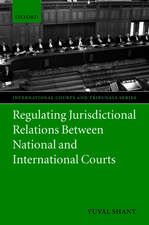Assessing the Effectiveness of International Courts: International Courts and Tribunals Series
Autor Yuval Shanyen Limba Engleză Paperback – 10 aug 2016
| Toate formatele și edițiile | Preț | Express |
|---|---|---|
| Paperback (1) | 291.38 lei 31-37 zile | |
| OUP OXFORD – 10 aug 2016 | 291.38 lei 31-37 zile | |
| Hardback (1) | 864.26 lei 31-37 zile | |
| OUP OXFORD – 30 ian 2014 | 864.26 lei 31-37 zile |
Din seria International Courts and Tribunals Series
- 11%
 Preț: 309.91 lei
Preț: 309.91 lei - 31%
 Preț: 619.45 lei
Preț: 619.45 lei - 14%
 Preț: 733.78 lei
Preț: 733.78 lei - 13%
 Preț: 885.52 lei
Preț: 885.52 lei - 34%
 Preț: 949.48 lei
Preț: 949.48 lei - 27%
 Preț: 491.70 lei
Preț: 491.70 lei - 23%
 Preț: 1441.24 lei
Preț: 1441.24 lei - 34%
 Preț: 820.89 lei
Preț: 820.89 lei - 27%
 Preț: 414.04 lei
Preț: 414.04 lei - 18%
 Preț: 949.47 lei
Preț: 949.47 lei - 30%
 Preț: 575.44 lei
Preț: 575.44 lei - 30%
 Preț: 736.20 lei
Preț: 736.20 lei - 8%
 Preț: 289.53 lei
Preț: 289.53 lei - 30%
 Preț: 863.99 lei
Preț: 863.99 lei -
 Preț: 482.06 lei
Preț: 482.06 lei - 30%
 Preț: 819.66 lei
Preț: 819.66 lei - 17%
 Preț: 221.31 lei
Preț: 221.31 lei - 30%
 Preț: 657.29 lei
Preț: 657.29 lei
Preț: 291.38 lei
Preț vechi: 315.89 lei
-8% Nou
Puncte Express: 437
Preț estimativ în valută:
55.75€ • 58.37$ • 46.13£
55.75€ • 58.37$ • 46.13£
Carte tipărită la comandă
Livrare economică 25-31 martie
Preluare comenzi: 021 569.72.76
Specificații
ISBN-13: 9780198794318
ISBN-10: 0198794312
Pagini: 344
Dimensiuni: 157 x 235 x 18 mm
Greutate: 0.52 kg
Editura: OUP OXFORD
Colecția OUP Oxford
Seria International Courts and Tribunals Series
Locul publicării:Oxford, United Kingdom
ISBN-10: 0198794312
Pagini: 344
Dimensiuni: 157 x 235 x 18 mm
Greutate: 0.52 kg
Editura: OUP OXFORD
Colecția OUP Oxford
Seria International Courts and Tribunals Series
Locul publicării:Oxford, United Kingdom
Recenzii
Are international courts effective? Scholars must decide whether the conceptual framework proposed by Shany is put to best use in a comparative analysis across different international courts, in an assessment of the effectiveness of an individual court on its own, or in both forms of application. Nevertheless, although future research will be instrumental in testing the methodology and concepts as developed, shining a spotlight on effectiveness is an important contribution.
Professor Shany's book is an extremely far-reaching and exhaustive study. For lawyers, particularly those concerned with the work of international courts, the great merit of the book is that it guides the reader to look beyond a court's judgments and opinions, and form a realistic picture of the actual impact beyond the courtroom that these may make, and in Professor Shany's apt terminology, to look beyond the 'output' of the court, and discern and assess the 'outcome'.
Rather than assessing effectiveness according to one or more of the usual indicators -- compliance with decisions, usage rates, impact on the conduct of parties - he puts forward a 'conceptual framework to analyze questions about the effectiveness of international courts, which could serve as the basis for future research programs'. Put differently, the book's focus is not on whether international courts are effective, but on how their effectiveness should be assessed. If judged by its title, this book makes for a surprising read. But it is a welcome surprise, and an enriching one. The conceptual framework set out is indeed 'sophisticated and complex', and it is presented in a tightly argued and dense manner. So all things considered, perhaps this book should be seen as a prologue to a new, and higher, level of engagement with effectiveness.
Shany's efforts to take seriously the exhortations towards effectiveness directed at international courts have led him to develop an ambitious goal-based analysis that proves successful in its application to a range of different institutions.
Professor Shany's book is an extremely far-reaching and exhaustive study. For lawyers, particularly those concerned with the work of international courts, the great merit of the book is that it guides the reader to look beyond a court's judgments and opinions, and form a realistic picture of the actual impact beyond the courtroom that these may make, and in Professor Shany's apt terminology, to look beyond the 'output' of the court, and discern and assess the 'outcome'.
Rather than assessing effectiveness according to one or more of the usual indicators -- compliance with decisions, usage rates, impact on the conduct of parties - he puts forward a 'conceptual framework to analyze questions about the effectiveness of international courts, which could serve as the basis for future research programs'. Put differently, the book's focus is not on whether international courts are effective, but on how their effectiveness should be assessed. If judged by its title, this book makes for a surprising read. But it is a welcome surprise, and an enriching one. The conceptual framework set out is indeed 'sophisticated and complex', and it is presented in a tightly argued and dense manner. So all things considered, perhaps this book should be seen as a prologue to a new, and higher, level of engagement with effectiveness.
Shany's efforts to take seriously the exhortations towards effectiveness directed at international courts have led him to develop an ambitious goal-based analysis that proves successful in its application to a range of different institutions.
Notă biografică
Professor Yuval Shany is the Hersch Lauterpacht Chair in International Law at the Law Faculty of the Hebrew University of Jerusalem. He also serves currently as the academic director of the Minerva Center for Human Rights, a director in the International Law Forum at the Hebrew University, and the Project on International Courts and Tribunals (PICT) and a member of the steering committee of the DOMAC project (assessing the impact of international courts on domestic criminal procedures in mass atrocity cases). Shany has degrees in law from the Hebrew University (LL.B, 1995 cum laude), New York University (LL.M., 1997), and the University of London (Ph.D., 2001) and he has published a number of books and articles on international courts and arbitration tribunals and other international law issues such as international human rights and international humanitarian law.
























